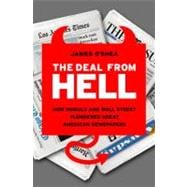
What is included with this book?
| Preface | p. ix |
| Introduction: The Merger | p. 1 |
| Beginnings: Des Moines | p. 15 |
| Across the Street | p. 27 |
| Otis Chandler's Legacy | p. 43 |
| Twilight | p. 55 |
| The New Order | p. 69 |
| The Cereal Killer | p. 85 |
| His Seat on the Dais | p. 105 |
| Inside the Merger | p. 123 |
| Making News | p. 135 |
| A Changing Landscape | p. 149 |
| Market-Driven Journalism | p. 163 |
| Buy the Numbers | p. 181 |
| Count Kern | p. 201 |
| Civil War | p. 219 |
| Up Against a Saint and a Dead Man | p. 231 |
| Before the Fall | p. 253 |
| The Penguin Parable | p. 269 |
| Closing the Deal | p. 293 |
| Zell Hell | p. 309 |
| Epilogue | p. 333 |
| Acknowledgments | p. 349 |
| Notes | p. 351 |
| Index | p. 379 |
| Table of Contents provided by Ingram. All Rights Reserved. |
The New copy of this book will include any supplemental materials advertised. Please check the title of the book to determine if it should include any access cards, study guides, lab manuals, CDs, etc.
The Used, Rental and eBook copies of this book are not guaranteed to include any supplemental materials. Typically, only the book itself is included. This is true even if the title states it includes any access cards, study guides, lab manuals, CDs, etc.
No one has ever told the story of the biggest merger in the history of American journalism and its long-lasting implications. Embedded in the failure of the marriage of the Tribune Company with the Times Mirror Company is a far broader story of monumental egos, fallible souls, larger-than-life characters, and cultural clashes about the collapse of newspapers—the institutions that write the first, crucial draft of history and the only industry America’s forefathers considered important enough to single out in the U.S. Constitution.
The conventional wisdom is that newspapers—and by that I mean the credible, edited information they deliver, and not just the paper and ink—fell into a death spiral because of forces unleashed by declining circulations and the migration of readers to the Internet. But the Internet and declining circulations didn’t kill newspapers, any more than long stories or skimpy attention spans did. What is killing a system that brings reliably edited news and information to readers’ doorsteps every morning for less than the cost of a cup of coffee is the way that the people who run the industry havereactedto those forces. The lack of investment, the greed, incompetence, corruption, hypocrisy, and downright arrogance of people who put their interests ahead of the public’s are responsible for the state of the newspaper industry today. I saw it, both as a longtime reporter and as an editor at theChicago Tribuneand theLos Angeles Times.